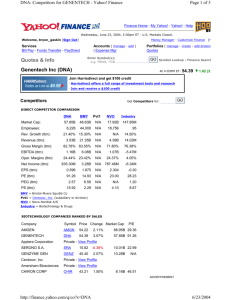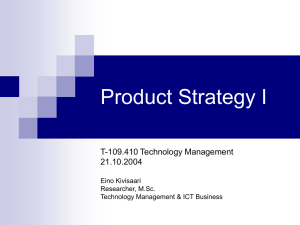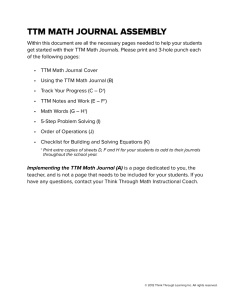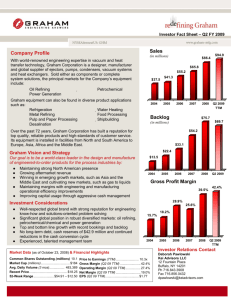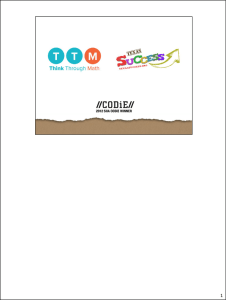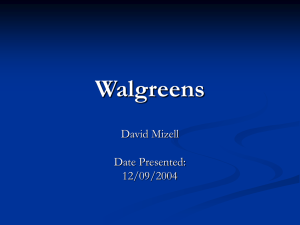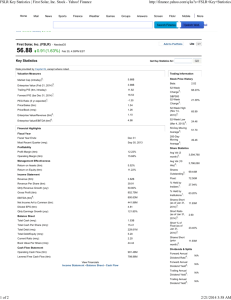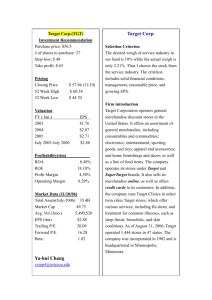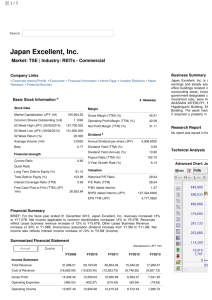USE MODELS ROTATIONS BEST PRACTICES TTM JOURNAL
advertisement
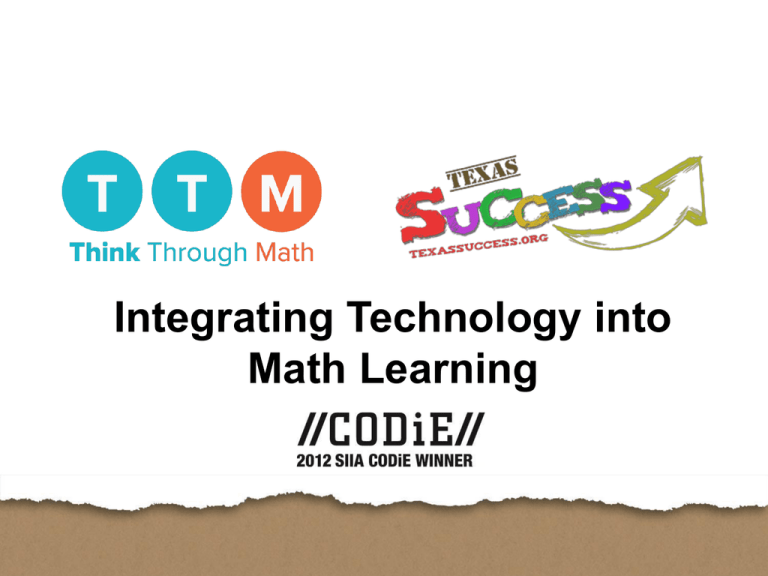
Integrating Technology into Math Learning SELECTED BY THE TEA Serving All Students Grades 3-8 The ultimate RTI solution Focused Instruction Targeting instructional goals for Texas Unlimited Access Web-based A FEW HEADLINES ABOUT TTM • Grounded in Research • Winner of the 2012 CODiE Award • Aligned to TEKS • Unprecedented Differentiation • Unprecedented Motivation AGENDA • Introduction to TTM • Program Effectiveness – Motivation – Adaptive Content – Real-Time Quality Instruction – Actionable Reports • Meeting the TEKS/STAAR Challenge • Navigating Think Through Math • Implementing for Results • Next Steps EXPECTED OUTCOMES Participants Will: • Learn the key components of the TTM Overview • Learn the purpose/objective of the components • Learn the three easy steps to getting started in Think Through Math INTRODUCTION INTRODUCTION OVERVIEW OF TTM VIDEO Watch video at http://texassuccess.org Write Down: • Questions • Things You Like EFFECTIVENESS KANAWHA COUNTY WEST VIRGINIA KANAWHA COUNTY SCHOOLS % STUDENTS TESTING PROFICIENT IN MATH Facts • 28,000 Students • 57% Below Mastery Implementation • 4 Middle Schools • 9 Weeks Results 38% Increase in Proficiency GARLAND TEXAS Demographics • 45% African American • 27% Caucasian • 19% Hispanic 57,000 Students Participants “At Risk” as defined by TAKS test scores MORE STUDENTS DOING MORE MATH A FORMULA FOR SUCCESS MEETING INDIVIDUAL NEEDS Student Motivation Easy-to-Use, Actionable Reports Adaptive Content Real-time, Quality Instruction MOTIVATION • Intrinsic • Extrinsic EXTRINSIC MOTIVATION DO MATH TO EARN POINTS Charities Class Goals Avatar Customization EXTRINSIC MOTIVATION FUN AND MOTIVATIONAL CONTESTS September–October March October–November April December–January January–February ADAPTIVE CONTENT ADAPTIVITY Adaptive Placement Grade-Level Pathway Tier 1 Lessons Tier 2 Lessons Precursor Lessons Inserted EXPERT TEACHING • U.S. based • Certified in math SUPPORT LADDER RESPONSE TO STUDENT NEEDS Concept Zone Expert Math Teacher Corrective Feedback LIVE TEACHER HOURS School Year 2012–13 DAY Monday–Thursday TIME (CST) 6:30 a.m.–11:00 p.m. Friday Saturday Sunday 6:30 a.m.–9:00 p.m. 10:00 a.m.–2:00 p.m. 5:00 p.m.–9:00 p.m. LESSON ACTIVITIES Live Teachers Available Test Out Option Activate Preview First Try 5-Step Process Prepare Show Mastery ACTIONABLE REPORTS REPORTS MEETING THE CHALLENGE STAAR/TEKS DEEPEN CONCEPTUAL UNDERSTANDING CURRENT STANDARD (G4 & G6) 2014 TEKS (G4) TEKS 6.2.A Model addition and subtraction situations involving fractions with objects, pictures, words, and numbers 4.3.B Decompose a fraction in more than one TEKS 6.2.B Use addition and subtraction to solve problems involving fractions and decimals 4.3.E Represent and solve addition and subtraction of fractions with equal denominators and referring to the same whole using objects and pictorial models that build to the number line such as strip diagrams and properties of operations. way into a sum of fractions with the same denominator using concrete and pictorial models and recording results with symbolic representations such as 7/8 = 5/8 + 2/8; 7/8 = 3/8 + 4/8… LET’S TAKE A LOOK STUDENT EXPERIENCE BREAK IMPLEMENTING FOR RESULTS Getting Started in 3 Easy Steps View training portal for additional training and support •Add Your Class(es) •Add Your Students •Print out Start Cards STUDENT RESULTS IMPLEMENTING WITH FIDELITY IMPLEMENTING FOR RESULTS FIDELITY •Utilize adaptivity •Complete 30 lessons or more over the course of a year •Pass 70% of lessons •Work in TTM at least 2-3 times per week •Complete a minimum of 60 – 90 minutes per week IMPLEMENTING FOR RESULTS FIDELITY •Use headphones •Build excitement with students •Establish and display clear goals and expectations •Require students to use a math journal •Monitor progress regularly •Have Fun! USE MODELS USE MODELS 1:1 BEST PRACTICES Logistics • One student at each computer • Headphones • Motivation System • TTM Journal USE MODELS 1:1 BEST PRACTICES Teacher Role • Monitor closely to ensure students are on task • Review data–the numbers talk! • Pull reports to group students for small-group instruction USE MODELS ROTATIONS Logistics • One student at each computer • Headphones • Motivation System • TTM Journal USE MODELS ROTATIONS BEST PRACTICES Teacher Role • Monitor closely to ensure students are on task • Review data in reports to group students for small-group instruction • Provide work for students not on computer • If there not enough computers to implement with fidelity, choose students with greatest need for “in-class” access; create “extended-day” access for other students. TTM JOURNAL BEST PRACTICES Standard Practices • Record Username/Password • Record weekly goals • Take notes • Build vocabulary • Reference information TTM JOURNAL BEST PRACTICES Student Opportunities 1. Show their work 2. Draw or diagram the problem 3. Demonstrate thinking process 4. Set goals EMBEDDED PROFESSIONAL SUPPORT EMBEDDED PROFESSIONAL SUPPORT LAUNCH EVENT STUDENT LAUNCH EVENT GETTING OFF TO THE RIGHT START Available on KNOWLEDGE BASE • Student video • Launch presentation • Best practices for the launch STUDENT LAUNCH EVENT A KICKOFF MATTERS • Introduce TTM in an assembly or Classroom Kickoff • Build excitement • Review program goals • Ensure effective use • Communicate expectations STUDENT LAUNCH EVENT A KICKOFF MATTERS Be Prepared! • • • • Print out students Start Cards Prepare TTM Journals or notebooks Complete tech check Read and understand the entire student launch PowerPoint Be Clear and Concise! • Aim for 20 minutes or less • Customize your slides where needed Be Excited! • Talk about the prizes, the avatars, and the Live Teachers. Your enthusiasm is infectious! NEXT STEPS: TRAINER PRIOR TO TRAINING Preparation • Add teachers • Prepare .csv and Upload • Add Teachers to Class Precision • Read and understand the PowerPoint and notes slides • Read and understand the Trainer Agenda Enthusiasm • Highlight the benefits of the program with enthusiasm QUESTIONS THANK YOU E-mail: support@thinkthroughmath.com scooper@thinkthroughmath.com Web: thinkthroughmath.com

